Albion’s Student EMTs: Building Careers, Saving Lives
The Lisa and James Wilson Institute for Medicine prepares and supports students in their premedical journey. For a growing number of them, that includes serving the community as a licensed emergency medical technician.
June 9, 2022
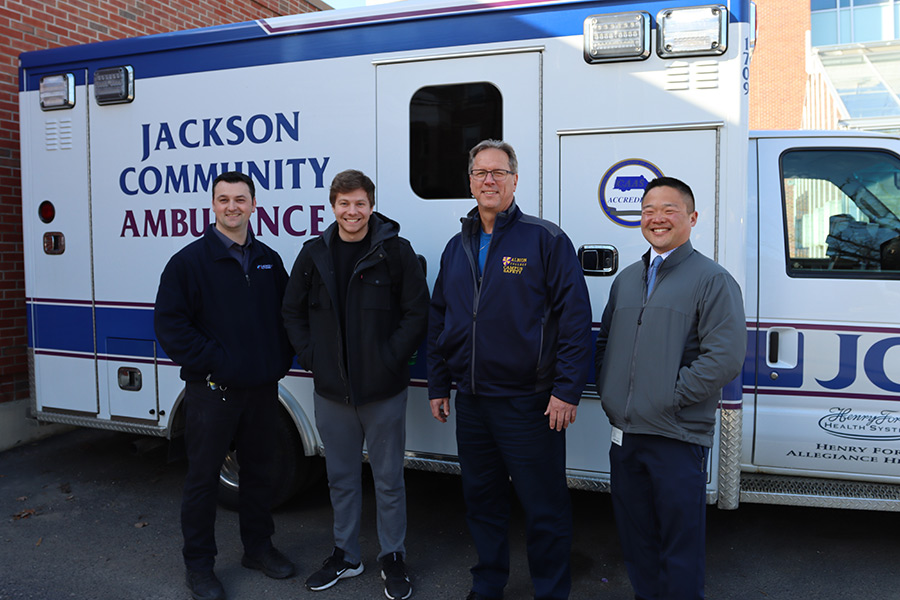
Through the efforts of the student-run EMS club, a dedicated ambulance vehicle was provided to Albion College this spring by Emergent Health Partners, which operates six community ambulances in southern Michigan, including Albion Community Ambulance and Jackson Community Ambulance. The vehicle is stationed in the Office of Campus Safety parking lot. Pictured from left: Emergent Vice President Brian Walls; Jack Brown, ’23, current president of the EMS club; Ken Snyder, associate dean of students and director of campus safety; and Emergent Vice President Karl Rock, ’07.
By Ariel Berry
Medical emergencies can happen in the blink of an eye, but Albion College is home to many student emergency medical technicians who are up for that challenge.
In fact, student EMTs have played a vital role in keeping everyone on campus safe. A recent example of this happened earlier this spring at Anchor Splash, the popular annual Greek life event hosted at the Dean Aquatic Center.
A student EMT, Jack Brown, ’23, remembers, “I was just hanging out with my fraternity brothers on the pool deck, and I started hearing yelling outside of the music and the routine that was going on. I looked up in the stands and I saw a circle around somebody, and that’s kind of a universal sign that, OK, there’s something wrong with that person. So, I started quickly going that way and one of my fraternity brothers, who’s also an EMT, followed me,” he says. “We got there and the person was sitting upright, super pale, not responding, their eyes were wide open. So, we did what we would normally do in that case — we checked for a pulse, and checked if they were breathing.”
The student EMTs quickly realized the situation was serious. “It didn’t look like he was breathing and the three of us who checked for a pulse could not feel one, so we laid him down and another student started doing compressions while I began to take the person’s shirt off so we could connect a defibrillator,” says Brown. “And then the person just woke up after seven to 10 compressions,” Brown says.
Thanks to the student EMTs’ swift action, the person revived completely. Several student EMTs were present and responded, including Zach Bleicher, ’22, Hannah Headapohl, ’22, and Madeline Budd, ’24. Their quick thinking and application of their training averted what could have been a tragic event.
Campus First Responders
These students were prepared for an emergency as a result of EMT certification training they received through a partnership between the Jackson Community Ambulance (JCA) and the College’s Lisa and James Wilson Institute for Medicine. Established in 2018, the Wilson Institute has prepared hundreds of Albion students for medical and professional school, encouraging them to pursue careers in the medical and health fields.
Additionally, a relatively new student organization, the EMS club, helps students learn about emergency medical services and get trained to provide life-saving skills through EMT work and CPR training, according to Maggie Godfrey, interim executive director of the Wilson Institute. “In collaboration with the EMS club, the Wilson Institute offers an EMT summer course for students interested in becoming EMT certified,” Godfrey says. “It is an intense 16-week course facilitated by JCA. We typically have about 10 students per year who take the course and become certified EMTs. Many continue to work in south central and southwest Michigan.”
Brown, a biochemistry major, psychology minor and president of the EMS club, says it’s vital to encourage students to get their EMT license. “Right now healthcare workers are at a serious shortage, and they have been for a while, and it’s just gotten worse,” he says. “But having the EMS club has allowed so many students on campus to get their EMT license and work as EMTs in the Albion area and around Jackson, which is providing support to our local healthcare system.”
An EMT for JCA himself, Brown last fall latched onto an idea that had once been a dream of the club’s founders. Brown wanted to have an on-campus ambulance that Albion student EMTs could use for campus emergencies. He worked with JCA and Ken Snyder, associate dean of students and director of campus safety, and this spring the dream became a reality.
The ambulance is stationed in the Office of Campus Safety parking lot. “Now, when there is a call on campus, EMT students get a notification on their phone and can make their way to that ambulance quickly, and then respond to that call to initiate care,” Brown says. “We’re essentially first responders for campus, because we can provide care and, if need be, even provide transport to the hospital.” He adds that while there is a local Albion Community Ambulance (ACA), “Sometimes that truck is in Jackson or otherwise engaged, and it just provides more support to campus.”
While several student EMTs fortunately were already at the scene of the Anchor Splash incident, the new campus ambulance service also functioned as it should. “We all got a notification on our phones,” Brown says. “That system worked out beautifully, and another student, Trey Warner, ’24, who is an EMT, had just finished dinner at the Malleable and was able to get to the Campus Safety parking lot, grab the ambulance and get to the Dow. He got there before the actual ambulance stationed out of Albion got there.”
Campus is already a safer place thanks to Brown’s efforts to have an ambulance more accessible.
Training Medical Professionals
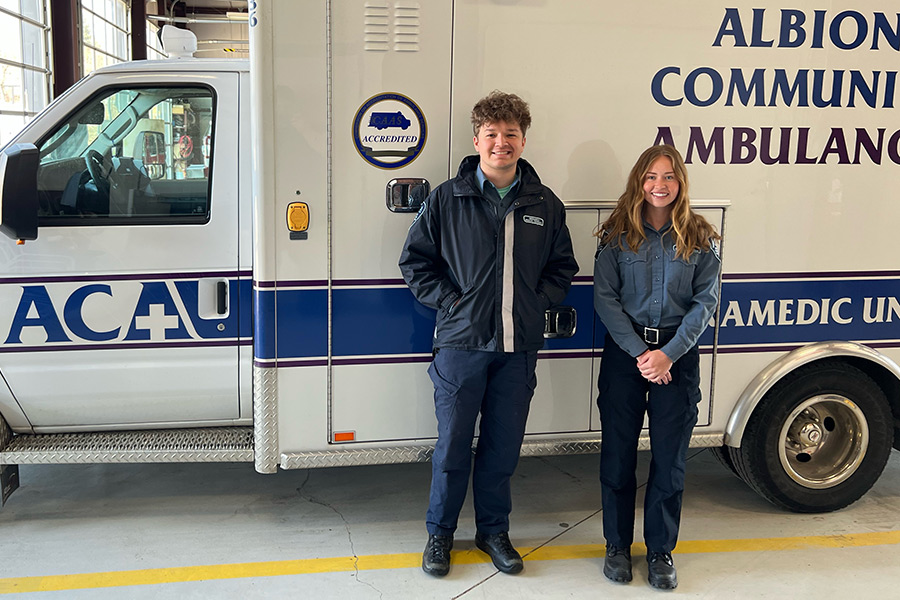
Albion students, certified EMTs: Noah Rollison, ’24 (left), and Madeline Budd, ’24, EMS club vice president.
Budd, the EMS club’s vice president, is a biochemistry major with a neuroscience concentration. She plans to be a doctor and says she learned about EMT certification through the Wilson Institute when she first joined the club. “I went through the course last summer and I just started working a few months ago and I really like it,” she says. “I did it for clinical hours for medical school. It’s a great way to get experience and I’ve learned a lot about dealing with patients.”
Budd now works with JCA as an EMT and says Albion College helped her get there. “The Wilson Institute was a huge part of that; they just explained the process of getting into medical school very well,” she says, adding that she realized the clinical hours from being an EMT would be invaluable when applying to med schools. There are approximately 350 students in the Wilson Institute, and each one is receiving the support they need to pursue work in the medical field.
“The Wilson Institute is the reason why I came to Albion College, for them to help me on the pre-med track,” Budd says. “They helped me pick out my classes and they even helped pay for our books for the EMT course.”
Albion recognizes that EMT training can be expensive, and the Wilson Institute does its best to help. In fact, Dr. Richard Swain, ’61, and Jenne Swain, ’62, recently gave a generous gift to the Institute to support clinical experiential learning (which includes EMT training) as well as to help ameliorate barriers to students successfully transitioning to medical school.
Dr. Brad Rabquer is an associate professor of biology at Albion and interim faculty director of the Wilson Institute. He emphasizes “how impressed I’ve been with the students who have run the EMS club, and that this was truly a student-developed club. It was students who wanted to do this; they made it happen and the Wilson Institute is here to support them.”
Budd says the College’s small size also played a role in preparing her for being an EMT, and her future as a doctor. Among the benefits: “overall, the professors and having such small class sizes and such personalized learning,” she says. “I’m not afraid to ask questions, and I feel like it’s really helped me to be outgoing in the field.”
The most meaningful part of being an EMT, Budd says, is “just being able to help people and give people some comfort when they’re having the worst day of their life.” Every call is important and unique. “I learn something new on every single shift,” she says.
Peace of Mind
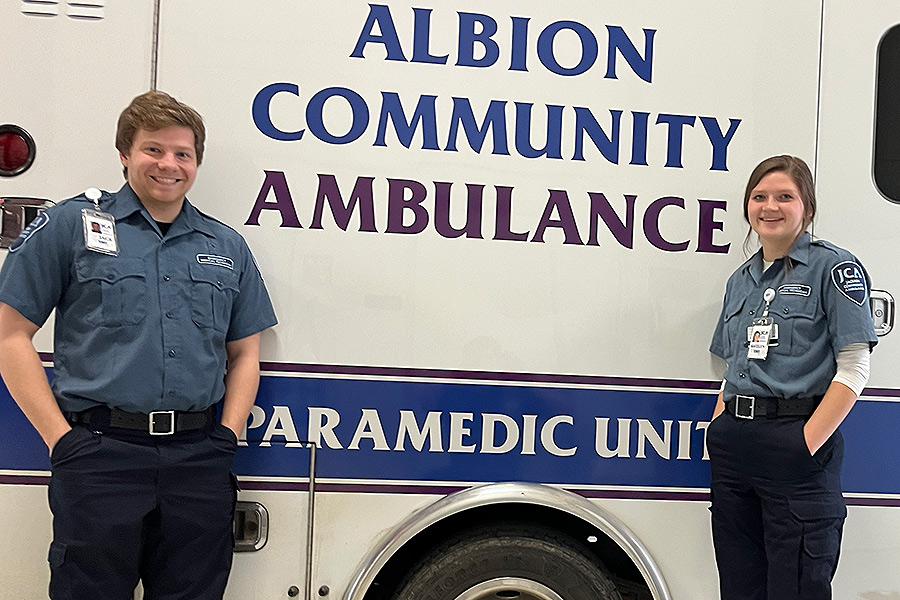
Kaitlyn Piontkowsky, ’23 (right, with Brown), is part of a dedicated group of Albion College student EMTs.
Another member of the club, Kaitlyn Piontkowsky, ’23, is a biochemistry and Spanish major minoring in art. She works for ACA as an EMT. Being an EMT is worth it, she says, because of the comfort that it gives other people who “have that security that there are people nearby who are willing to drop anything to help you, and it’s really nice being able to go in the house and, even if it’s not a serious call, to give someone peace of mind that they’re going to be OK,” she says.
The EMS club has prepared her for her work as an EMT through “scenario nights,” where the students practice assessing medical crises and learn how to treat them. In the field, Piontkowsky says, “You get really interesting calls over the radio and you don’t know exactly what you’re coming to. You know you’re kind of preparing for it during class, and you’ve talked about it a lot, but you’ve never really seen something like that. So, it’s really interesting to be able to go and actually see cases and actually be able to help people like that.”
Noah Rollison, ’24, a biochemistry and biology major, works as an EMT for JCA. He says his regular Albion classes have helped him in his work as well. “They’ve definitely aided in my decision making; taught me how to think critically, especially in the sciences, facing a new challenge every day in the lab or in the classroom; and helped shape how I try and solve problems on the job,” he says.
Being an EMT as a college student is special, Rollison explains. “I think my favorite aspect of the job is just the patient satisfaction and knowing that you’ve done well,” he says. “Someone can be in a very, very unfortunate predicament and we come in and are comforting. It’s very rewarding and amazing just to be a part of that. I think it gives you a unique experience, especially as a younger person in college to make a huge impact.”
Not everyone in the EMS club is an EMT. Sathwik Reddy, ’24, a biology major, is on the club’s executive board, and while he isn’t an EMT, he says being in the club is still a valuable experience. “You are in an environment with people who all have an interest in medicine and that is something really great, especially if you want a career in the healthcare field,” he says. “I want to be some sort of doctor, and being in the EMS club helps you gain some important skills to help you prepare for the medical world.”
The Alumni Perspective
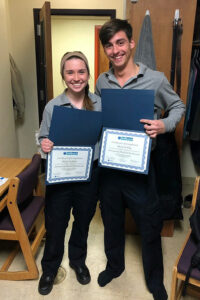
A goal realized: Becca Rychener, ’21 (left), and Max King, ’21, cofounded Albion’s EMS club with the intention to station an ambulance on campus.
The co-founder of the EMS club, Max King, ’21, majored in biochemistry and math/physics. He is now an EMT for Emergent Health Partners, working in Jackson, Albion and Lenawee. King and classmate Becca Rychener, ’21, formed the club with the goal of getting enough student EMTs on campus to have a campus ambulance. The goal may have been realized after their graduation, but King and Rychener laid the groundwork for the successful ambulance service today. It was “driven from our desire to make a positive impact in the Albion community,” King says.
His time at Albion prepared him for his current career, he says. “Albion’s biology and chemistry classes gave me a great foundation in terms of knowledge that would need to be applied in the field of EMS and in medicine in general,” he says. “The teachers are second to none and I am incredibly grateful for each of them, as they have given me everything I need to be successful in EMS and in my continuing education.”
Bram Siemers, ’19, graduated with a biochemistry degree and is now a senior paramedic for JCA. He agrees with King’s assessment. “Albion’s science programs helped a lot,” he says. “The biochemistry degree was phenomenal, which I can’t stress enough.”
Still, Siemers found his nonscience-oriented classes to be helpful as well, specifically citing offerings in the departments of Modern Languages and Cultures and Women’s, Gender and Sexuality Studies. “[They] have allowed me to gain more appreciation for poverty and less fortunate groups of people,” he says. “This has always been a big area of focus in healthcare and EMS even before the COVID-19 crisis, since healthcare aims to improve health and quality of life in this population.”
Siemers recommends working in EMS to all who are interested. “As of now, I’m just over nine years working in EMS,” he says. “It’s been a fulfilling job and a great way to learn how healthcare and the community function. I would recommend it to those interested in career routes related to nursing and nurse practitioners, respiratory therapy, physician assistants, veterinarians and medical doctors or doctors of osteopathy.”
A History of Making a Difference
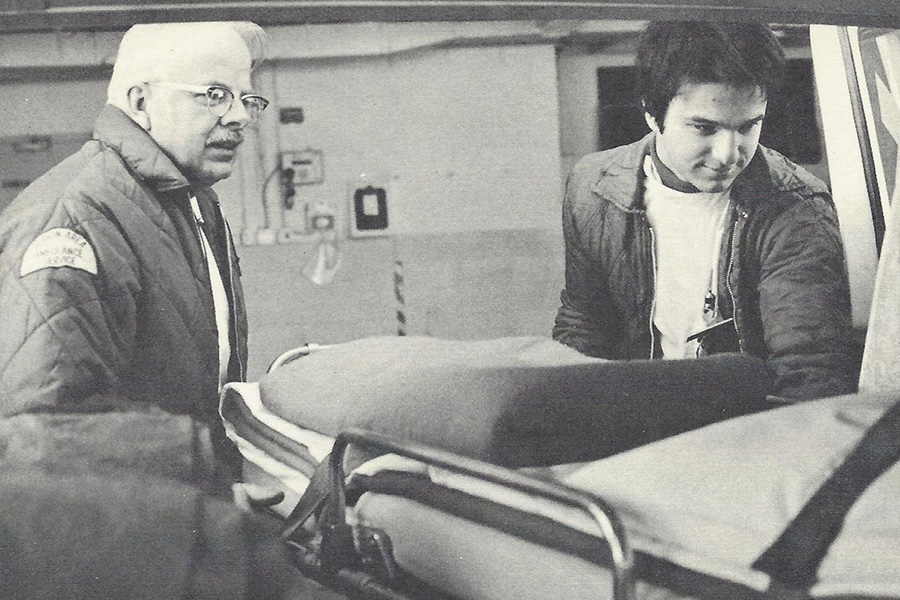
The link of Albion College to EMT service includes Interim President Joe Calvaruso, ’78, pictured at right in a fall 1976 Io Triumphe! magazine story with longtime biology professor and Albion resident Dr. Ken Ballou, ’47.
In 1973, one notable high schooler, Joe Calvaruso, ventured onto the Albion campus to train as an EMT, back when the City of Albion held EMT training in the Norris Center. Calvaruso served as an EMT his senior year at Albion High School, and when it was time to apply to colleges, he knew exactly where he wanted to go. Calvaruso worked as a student EMT while attending Albion College, and after his graduation in 1978 he continued to serve, adding up to seven years in total.
“At the time Albion was totally a volunteer ambulance. We didn’t get a dime for doing any of the runs, it was all just because we loved helping the community and wanted to be involved,” says Calvaruso, current interim president of the College.
Though he later switched to business, Calvaruso began his time at Albion College as a pre-med student, and his interest in healthcare continues to this day.
“I’m still licensed [as an EMT] today,” he says, adding, “About the time I always think, ‘I’m not going to renew my licensing, I’m not going to get the additional training, I’m not going to keep the hours,’ then something happens and I think, ‘Yes, I’m going to continue that. It’s worthwhile.’”
One such incident happened recently, when Calvaruso was at a College event and someone passed out behind him. Calvaruso was able to give the person medical attention and calm the family. It’s moments like that, he says, that remind him it’s all worthwhile.
Calvaruso had such a good EMT experience in college that he encourages current students to become EMTs. “It’s a good way for students to feel like they’re getting involved and making a difference in the community and a difference in their career, their future, getting that type of hands-on experience,” he says. “It helped me think differently — in being able to, in emergency situations, think on your feet, when you’ve got a few seconds to make a difference in a lot of cases, and so you just make a decision.”
Being a student EMT offers invaluable personal and professional development. “The more of these unique opportunities you pick up along the way, they just make your life richer,” Calvaruso says.
Albion provides a true liberal arts experience, allowing students — many of them future doctors — to become well-rounded academically as they take advantage of EMT and other unique opportunities for learning outside the classroom. Rabquer, the Wilson Institute’s interim faculty director, says, “The benefit of being in a liberal arts premedical program is the training students receive beyond the sciences, and the emphasis we place on understanding languages and cultures, and learning more about the human experience through psychology, and how all of that contributes to making students into better physicians.”
For students who want to make their education engaging and their lives richer, Albion is the place to be.